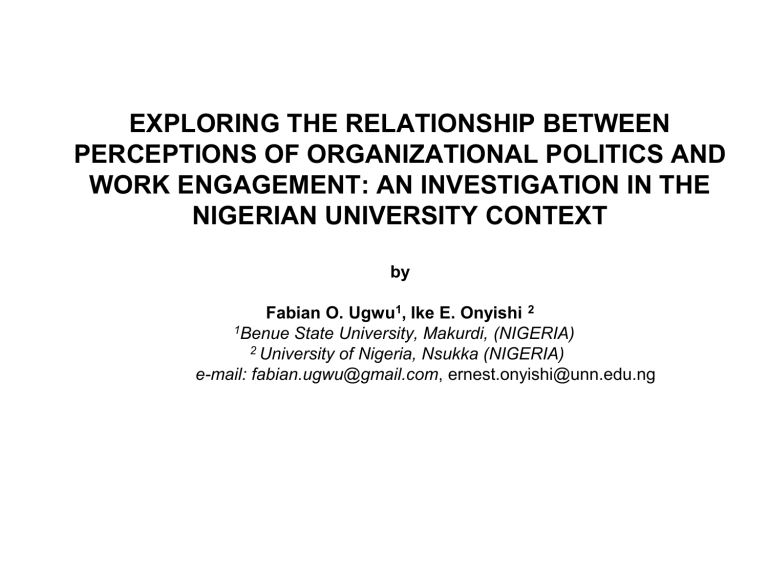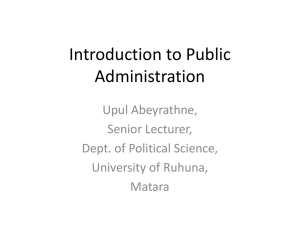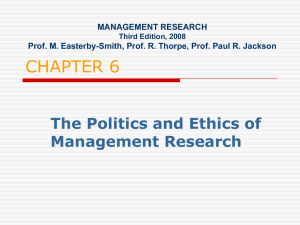EXPLORING THE RELATIONSHIP BETWEEN

EXPLORING THE RELATIONSHIP BETWEEN
PERCEPTIONS OF ORGANIZATIONAL POLITICS AND
WORK ENGAGEMENT: AN INVESTIGATION IN THE
NIGERIAN UNIVERSITY CONTEXT by
Fabian O. Ugwu 1 , Ike E. Onyishi 2
1 Benue State University, Makurdi, (NIGERIA)
2 University of Nigeria, Nsukka (NIGERIA) e-mail: fabian.ugwu@gmail.com
, ernest.onyishi@unn.edu.ng
Abstract
There is hardly any doubt that politics is a fact of organizational life and has some far reaching implications to organizations. Despite the fact that it has been related to many job behaviors and attitudes, studies on perceptions of organizational politics and employee work engagement have been very scarce and needed to be given more attention. In addition, studies of politics proliferates organizational psychology literature, but its influence in the educational sector has been profoundly ignored. As we expected, the results of the regression analyses showed that perception of organizational politics was negatively related to work engagement. The results equally showed that only GPB was positively related to dedication. GAGA and PPP were both negatively related to vigor, dedication and absorption. Findings have been discussed in the light of the Nigeria educational system. The study ’ s implications for development of best practices in university management and employee motivation were discussed.
Introduction
•
Politics which was once thought to belong to the realm of political science and which ultimate goal is to gain and consolidate political power has gained more popularity and has advanced to also become a fact of organizational life.
Although many managers may be reluctant to admit that politics is a way of life in organizations [1], it does not expunge the notion that politics is ubiquitous in most organizations. Since the past few decades, perceptions of organizational politics (POPs) have been extensively studied and have emerged as a good predictor of job outcomes and job performance (e.g., Vigoda-Gadot, 2003;
Vigoda-Gadot, & Drory, 2006).
•
Beyond its proven consequences, organizational politics has become very difficult to understand. This may be the reason Vigoda and Cohen (2002) asserted that organizations politics is a controversial concept. While there is hardly any doubt that internal politics is a common phenomenon in every organization (e.g., Pfeffer, 1992; Ferris, 1995), very little is known about its nature and boundaries (Cropanzano, Howes, Grandey & Toth, 1997). It also has been viewed as an elusive type of power relationship in the workplace (Vigoda-
Gadot & Talmud, (2010).
Introduction
• In a typical Nigerian university setting, politics has remained a frequent discussed issue, ranging from selection of university vice chancellors, constitution of university governing council, appointment of top management personnel to recruitment of other staff members.
• Perception people hold about the prevailing politics and political structures in Nigeria universities may pose a challenge to work performance.
Introduction…
• The current article focuses on understanding how employees ’ perceptions of organizational politics) is related to work engagement.
However, despite the intuitive appeal of the fact that perceived politics is related to some key individual-level outcomes associated with organizational effectiveness; including job satisfaction, affective organizational commitment [13], organizational citizenship behaviours
(OCB) (Ferris, Adams, Kolodinsky, Hochwarter, & Ammeter, 2002), surprisingly researchers have ignored its relationship with work engagement. There is observed dearth of literature on the relationship between perceptions of organizational politics and work engagement.
The main purpose of this study is to examine the relationship between perceptions of organizational politics (POP) and different dimensions of employee work engagement in the Nigerian university context.
• It is therefore proposed that perceptions of politics would negatively influence employee work engagement
Method
Participants and Procedure
• The participants comprised of 211 focal employees and 23 supervisors
(Heads of Department). This study was conducted in two-phase: the focal employees completed the Perceptions of Organizational Politics
Scale, while their supervisors completed the Utrecht Work engagement
Scale for their respective staff members, rating how engaged they felt their staff are with their work. These questionnaires were coded to be able to match the self-report of the perceptions of politics with that of supervisor report work engagement. The participants were drawn from
Benue State University, Makurdi, North central, Nigeria. They were
61% male. Their ages ranged from 29 to 59 years with average age of
39.3 years. Participation in the research was voluntary and employees were assured of confidentiality of their responses. The participants had a minimum of a second degree and were all lecturers in the university.
However, a total number of 233 questionnaires were administered but only 211 (90.56%) were adequately completed, returned and matched for the data analysis.
Method cont….
•
Instruments
Perceptions of Organizational Politics Scale (POPS)
Perceptions of organizational politics were measured with the Perceptions of
Organizational Politics Scale. This scale identifies three dimensions, including:
General Political Behavior (2 items) , Go Along To Get Ahead (7 items) , Pay and
Promotion Policies (6 items) . Sample POP scale items for the scale is: “ People in this organization attempt to build themselves up by tearing others down ” The
Cronbach alpha for general political behavior subscale is α = .77; go along to get ahead is α = .78; and pay and promotion policies is α = .73.
Work engagement Scale (supervisor-report Scale)
The short version of the Utrecht Work Engagement Scale (UWES-9) was used to measure work engagement. Sample items include: “ At his/her work, he/she feels bursting with energy ” (vigor). Cronbach alpha was .87 for the present study.
• Analysis
The SPSS 17.0 for windows was used for analyzing the data. The first hypothesis that tested the relationship between perceptions of organizational politics and work engagement was analyzed using regression analyses.
Correlation analyses were used to test the relationships between each dimension of perceptions of organizational politics: GAGA, GPB, and PPP and dimensions of work engagement: vigor, dedication and absorption.
Results
• The result of the regression analyses computed on the perceived organizational politics and work engagement as composite scores showed that both constructs are negatively and significantly related (β = -.30, p < .001).
• More so, the results of the correlation analyses computed to ascertain the relationship between the dimensions of perceived organizational politics and work engagement revealed that
General Political Behaviour (GPB) was positively related to dedication (r = .05). GPB was negatively and significantly related to vigor and absorption with values of (r = -.15, p < .05) and (r = -. 14, p < .05) respectively.
• The result equally indicated that Go Along to Get Ahead
(GAGA) was negatively and significantly related to dedication (r
= -. 19, p < .01), vigor (r = -.21, p <.01) and absorption (r = -. 18, p <.01). The results further revealed that Pay and Promotion
Policies (PPP) was negatively and significantly related to dedication (r = -.26, p <.01), vigor (r = -.13, p <.05), and absorption (r = -.21, p <.01).
Discussion
•
The result obtained indicated that perceived organizational politics was negatively and significantly related to work engagement. This result seems to be consistent with Zhou and Ferris (1995) who found negative effect of organizational politics on job satisfaction. The result is also in alliance with that of Randall, Cropanzano, Bormann and Birjulin (1999) and Vigoda (2000) which observed that perception of politics is negatively related to organizational commitment.
• Generally, the findings of the present study have underlined the negative impact perceptions of organizational politics on the Nigeria university lecturers. Suffice to state here that many universities in Nigeria have environments that are often political in nature. This to a great extent negates the core values of research and teaching. Moreover, organizational politics are often viewed as a dysfunctional, divisive aspect of work environments (Mintzberg, 1983) and it has continued to influence critical issues such as performance evaluation, resource allocation, and managerial decision making) that influence organizational effectiveness and efficiency (Kacmar, & Baron, 1999). When the teachers on whose shoulders the future of the young people rests and who have the mandate of preparing their younger generation with the task of nation-building begins to play politics then the future of such country is mortgaged as may be evident in many institutions of higher learning in the country.
Conclusion
Teachers by virtue of their role in all societies occupy a very sensitive position in the overall development of the society. Their job of research, teaching and developing young people is so critical to be toiled with. In other words their job is second to none, but when they are distracted by politics which is commonplace in many Nigerian educational institutions, then the country is at risk of having incompetent policy makers and implementers in the long run which ultimately threatens the nations quest of realizing her ambition of becoming one of the twenty most developed economies by the year 2020.









